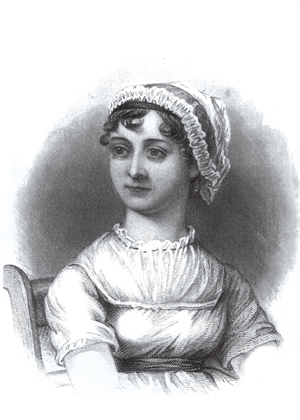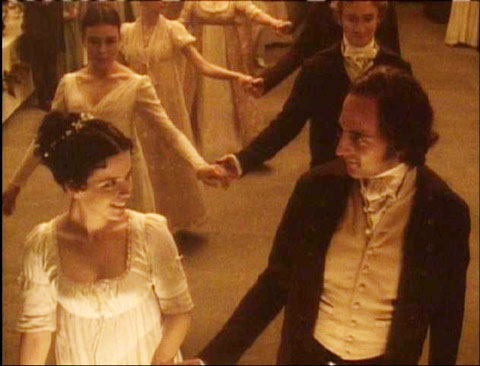A World to Fall in Love With?
 The Jane Austen/Warren Hastings connection Lauren posted about recently got me thinking about another kind of Austen connection: Not, this time, of reach beyond the circumscribed geography of her life, but rather of the density of connection within her books, as three or four families in a country village (to use Austen's own words) become a palpable community that resonates with shared (if sometimes contested and often unspoken) experience.
The Jane Austen/Warren Hastings connection Lauren posted about recently got me thinking about another kind of Austen connection: Not, this time, of reach beyond the circumscribed geography of her life, but rather of the density of connection within her books, as three or four families in a country village (to use Austen's own words) become a palpable community that resonates with shared (if sometimes contested and often unspoken) experience.When I began writing romance, one rule I encountered was not to create too many minor characters. Which is a reasonable enough stricture for a beginning writer, and most particularly one bound by the Iron Law of Thou Must Foreground the Romance Plot.
But as I continue, I find myself so taken with the idea of a world built upon the interlaced lives of its characters (major and minor), that I'm increasingly willing to stub my writerly toes on the boundaries of the genre (especially when I'm fortunate enough to have readers like Tumperkin, who's blogged so eloquently of my efforts to try to create a web of character relationships).
And if it's chutzpah to stub my toes (and bang my head) against something Jane Austen did so brilliantly, not to speak of more or less having invented... well, no guts, no glory. I want a hero and heroine who can live not just for and with each other; not just behind the well-guarded estate gates of Pemberley; but in a community, even a society.
I want to try to model what's so often implicit in social relationships: the delicate and almost unspeakable matters of social class and cultural capital, as not only to mark power and opportunity but to wonder what "value" really is.
 Because while there's a kind of fairy tale thrill in having a viscount marry a scullery maid (as in my first shot at romance, The Bookseller's Daughter), it seems to me a deeper and much touchier business for to create a pair of lovers who try to negotiate the smaller stuff -- old money versus new, aristocracy versus "trade."
Because while there's a kind of fairy tale thrill in having a viscount marry a scullery maid (as in my first shot at romance, The Bookseller's Daughter), it seems to me a deeper and much touchier business for to create a pair of lovers who try to negotiate the smaller stuff -- old money versus new, aristocracy versus "trade."Which is why, when I began to research post-Waterloo England for my domestic spy story The Slightest Provocation, I became fascinated by the contentious relationships between the old landed aristocracy like Kit's family, versus t
 he middling people in the professions or in trade, like Mary's brewer father.
he middling people in the professions or in trade, like Mary's brewer father.And which is also why (as you may have surmised from a whole lot of my posts) I spend a ridiculous amount of my research time simply rereading Emma -- the only one of Jane Austen's novels bearing the name of an individual protagonist as its title just happening to be (snarkily, paradoxically, Jane-ishly) her most brilliantly elaborated group portrait, a mini-world of tiny, all-important social distinction.
The paradox is easy to miss, partly because part of the world of romance fiction is already, traditionally, a world of wanting a more romantic world than you find yourself in.
Austen had already written about romantic, poetry- and novel-reading heroines (Marianne Dashwood in Sense and Sensibility and Catherine Moorland in Northanger Abbey) who couldn't "read" the worlds around them any more than Bridget Jones can read hers. But handsome, clever, rich Emma Woodhouse doesn't even have the excuse of female Quixotism to excuse her misapprehensions: she does what she does merely from a youthful excess of self-importance, an intolerance for the ordinariness of village life.
While as for the Austen fan who might be led to similar misapprehension -- like one who once announced she particularly enjoyed the Gwyneth Paltrow Emma movie because that Emma is liked by everyone in Highbury.... Well, I'll be more tolerant of this readying than Emma might have been. Because part of the responsibility must surely be ascribed to the Austen Industry's desire to keep us falling in love with that well known and adorable green-lawn-and-white-muslin England that never existed -- most especially not in the world of Jane Austen's imagination.
Here's an experiment for those of you who love re-reading Jane Austen: Read Emma with special attention (no skipping!) to everything tiresome Miss Bates and infantile Mr. Woodhouse have to say. You already know the Emma/Knightley story well enough; this time follow the apothecary Mr. Perry on his rounds and take note of Mr. and Mrs. Cole, Mrs. Goddard, the Martins, perhaps even the Cox family.
In other words, try to read it just once with the romance plot relegated to the background.

(While also endeavoring to wipe your memory clear of Gwyneth Paltrow and especially the far-too-pretty Jeremy Northam. The 1996 TV Emma with Kate Beckinsale and a powerful, peremptory, looking-his-age Mark Strong is much more to the point -- though not surprisingly, unavailable available on DVD.)
But the important thing is to try and keep your readerly attention on what the "minor characters" say and do.
I think you'll be as surprised as I was, to trace the patterns of social mobility and conflict as business is done and fortunes rise in quiet, boring Highbury during the moment we call the Regency (which is also the moment just before the Industrial Revolution embarks upon its mad tear from steam power and the railroads to global warming and the world wide web).
And you might also be surprised how much information is shared and exchanged between these minor characters. As Miss Bates says, "What is before me, I see." Try seeing it with her, as her world practically lifts off the page and into orbit on the depth, power, and density of Austen's realization.
It's not exactly a world to fall in love with.
But it might be an interesting and challenging one to fall in love within.
To which I also want to add a word of correction to my previous post last month about sickness and related matters in Regency England, about consumption in the nineteenth century imagination -- wondering whether the disease might have had a sort of unspoken presence in Emma.
I wasn't entirely right. It's not unspoken; it's genteelly spoken. When Jane Fairfax falls ill (during the darkest period of the novel for many of its characters) the local apothecary Mr. Perry reports nothing touching the pulmonary complaint, which was the standing apprehension of the family...
But I was right in the long term. Particularly at at time when tuberculosis (consumption, the pulmonary complaint) was understood as hereditary, Miss Bates (whose sister died of the disease) is clearly filled with apprehension every time her sister's daughter Jane catches the sniffles. And the sensitive circumlocution of Mr. Perry's report is particularly touching in that given the state of medical science, sensitivity was probably the only thing he could realistically offer anyone who fell ill in Highbury.
Finally, though, the big question here is, Is Emma a romance novel? Chicklit? Realist fiction? Or even (with all its misunderstandings, all that stuff you have to strain to hear and interpret) a precursor of the genteel mystery novel? (Remembering as well that one of the smartest cinematic interpretations of the novel ever was called Clueless.)
Contemporary advocates for the respectability of today's popular romance genre want Jane Austen firmly in our corner.
History hoydens -- writers and readers both -- what do you think?
(note: I'm at the New Jersey Romance Writers Conference, but I will try to check in for discussion)



Comments
Post a Comment